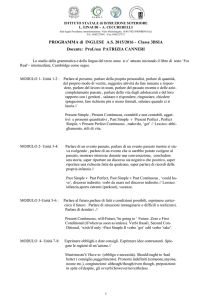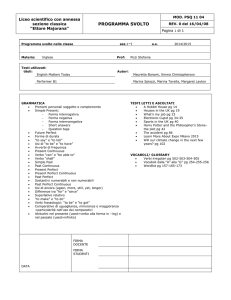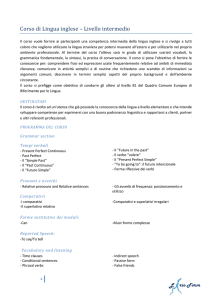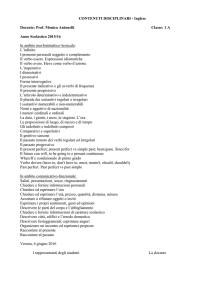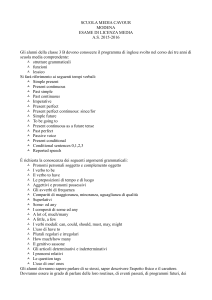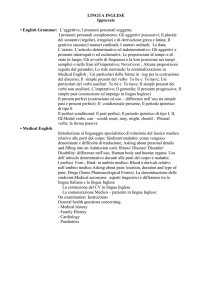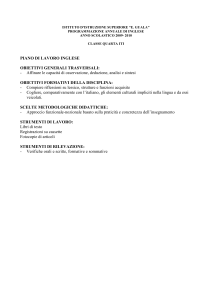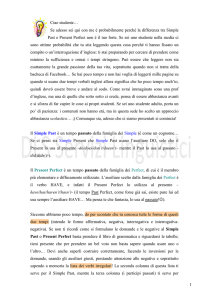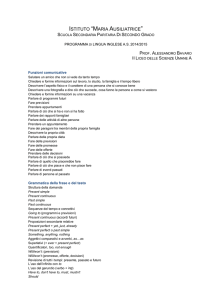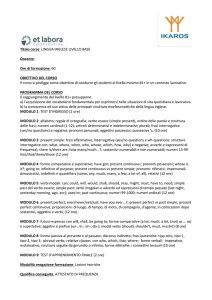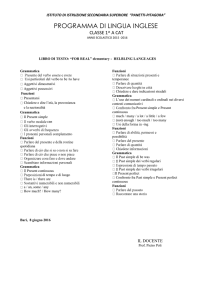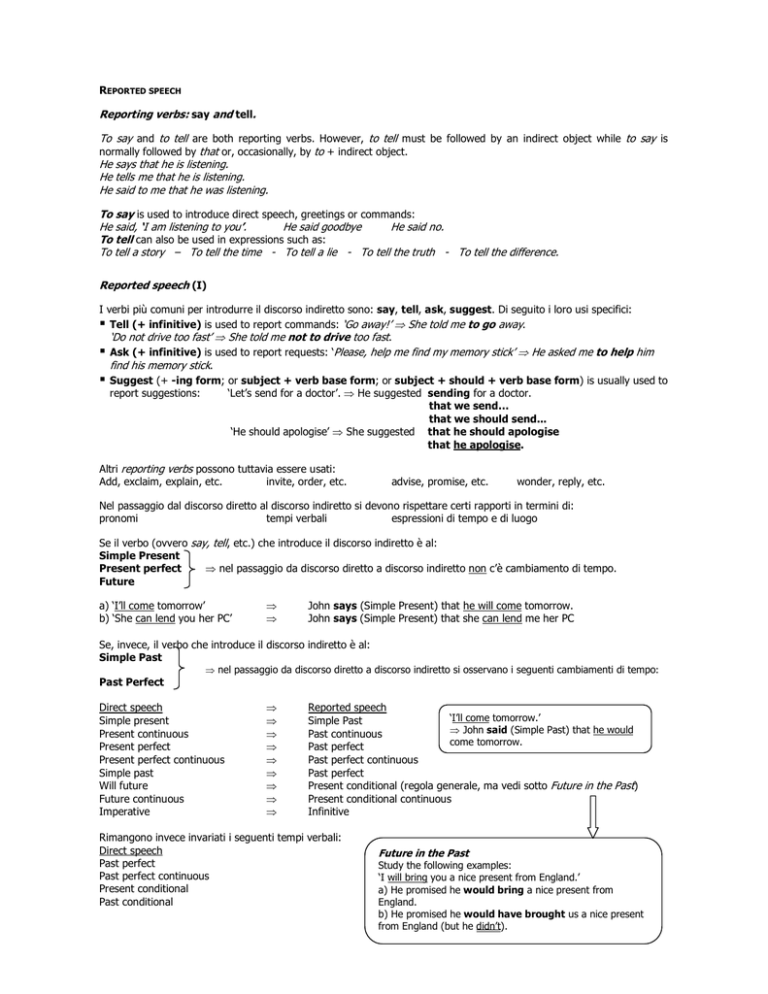
REPORTED SPEECH
Reporting verbs: say and tell.
To say and to tell are both reporting verbs. However, to tell must be followed by an indirect object while to say is
normally followed by that or, occasionally, by to + indirect object.
He says that he is listening.
He tells me that he is listening.
He said to me that he was listening.
To say is used to introduce direct speech, greetings or commands:
He said, ‘I am listening to you’.
He said goodbye
He said no.
To tell can also be used in expressions such as:
To tell a story – To tell the time - To tell a lie - To tell the truth - To tell the difference.
Reported speech (I)
I verbi più comuni per introdurre il discorso indiretto sono: say, tell, ask, suggest. Di seguito i loro usi specifici:
Tell (+ infinitive) is used to report commands: ‘Go away!’ ⇒ She told me to go away.
‘Do not drive too fast’ ⇒ She told me not to drive too fast.
Ask (+ infinitive) is used to report requests: ‘Please, help me find my memory stick’ ⇒ He asked me to help him
find his memory stick.
Suggest (+ -ing form; or subject + verb base form; or subject + should + verb base form) is usually used to
report suggestions:
‘Let’s send for a doctor’. ⇒ He suggested sending for a doctor.
that we send…
that we should send...
‘He should apologise’ ⇒ She suggested that he should apologise
that he apologise.
Altri reporting verbs possono tuttavia essere usati:
Add, exclaim, explain, etc.
invite, order, etc.
advise, promise, etc.
wonder, reply, etc.
Nel passaggio dal discorso diretto al discorso indiretto si devono rispettare certi rapporti in termini di:
pronomi
tempi verbali
espressioni di tempo e di luogo
Se il verbo (ovvero say, tell, etc.) che introduce il discorso indiretto è al:
Simple Present
Present perfect
⇒ nel passaggio da discorso diretto a discorso indiretto non c’è cambiamento di tempo.
Future
a) ‘I’ll come tomorrow’
b) ‘She can lend you her PC’
⇒
⇒
John says (Simple Present) that he will come tomorrow.
John says (Simple Present) that she can lend me her PC
Se, invece, il verbo che introduce il discorso indiretto è al:
Simple Past
⇒ nel passaggio da discorso diretto a discorso indiretto si osservano i seguenti cambiamenti di tempo:
Past Perfect
Direct speech
Simple present
Present continuous
Present perfect
Present perfect continuous
Simple past
Will future
Future continuous
Imperative
⇒
⇒
⇒
⇒
⇒
⇒
⇒
⇒
⇒
Reported speech
‘I’ll come tomorrow.’
Simple Past
⇒ John said (Simple Past) that he would
Past continuous
come tomorrow.
Past perfect
Past perfect continuous
Past perfect
Present conditional (regola generale, ma vedi sotto Future in the Past)
Present conditional continuous
Infinitive
Rimangono invece invariati i seguenti tempi verbali:
Direct speech
Past perfect
Past perfect continuous
Present conditional
Past conditional
Future in the Past
Study the following examples:
‘I will bring you a nice present from England.’
a) He promised he would bring a nice present from
England.
b) He promised he would have brought us a nice present
from England (but he didn’t).
Variazione delle espressioni di tempo e luogo nel reported speech.
This
⇒ that
Here
⇒ there
Now
⇒ then
Today/tonight
⇒ that day/night
Yesterday
⇒ the previous day, the day before
Tomorrow
⇒ the following day, the day after, the next day
The day before yesterday
⇒ two days before
The day after tomorrow
⇒ in two days’ time
An hour/a day/ a week ago
⇒ an hour/a day/ a week before
Last week/month
⇒ the previous week/month
Next week/month
⇒ the following week/month
Reported speech (II) – Periodo ipotetico nel discorso indiretto
Study the following examples:
‘I’ll come if I have time’
⇒ He said he would come if he had time
‘I would come if I had time’
⇒ He said he would come if he had time
‘I would have come if I had had time’
⇒ He said he would have come if he had had time.
Se ne ricava che nel riferire un periodo ipotetico cambia solo quello denominato First conditional

